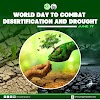Nigeria, like many nations, has embarked on a transformative journey to achieve the Sustainable Development Goals (SDGs), a universal call to action to end poverty, protect the planet, and ensure prosperity for all by 2030. In this progress report, we will delve into the status of key SDGs in Nigeria, namely No Poverty, Zero Hunger, Gender Equality, Decent Work and Economic Growth, and Industry, Innovation, and Infrastructure.
1. No Poverty and its Impact on Zero Hunger
Nigeria has made commendable strides in reducing poverty, with poverty rates declining over the years. However, there's not been a lot of progress, and this greatly affects the implementation of Zero Hunger. According to national reports, more than 36% of the Nigerian population still live under the poverty threshold of US$3.65 a day. Addressing poverty is key to eradicating hunger; sustainable development necessitates ensuring that individuals have the means to secure adequate food.
2. Gender Equality
Progress in achieving gender equality has been notable, with increased access to education and a growing presence of women in the workforce. Despite this, there are still gender disparities in the country. For example, according to World Bank, the percentage of seats(positions) held by women in single or lower chambers of national parliaments is a low value of 3.61%. There is still work to do to eliminate the barriers hindering women's full participation in all aspects of society.
3. Decent Work and Economic Growth
The growth of the country's GDP continues to decline. And the major challenge lies in creating sufficient decent employment opportunities. Currently, there is a large number of people in the labour market who are willing to work but are not employed. We still have a long way to go in ensuring that fundamental labour rights are effectively guaranteed. Approving job quality, security, and fair wages is crucial to ensuring that economic growth translates into improved livelihoods for all citizens.
4. Industry, Innovation, and Infrastructure
Investments in industry, innovation, and infrastructure have seen positive developments, but the pace needs acceleration. Studies reveal that, at least 75% of the rural population live within 2 km of an all-season road. The goal, however, is to leave no one behind.
Another progress is that a larger number of the population now have internet access as well.
Robust infrastructure and innovation are vital to sustaining economic growth, driving productivity and fostering a conducive environment for businesses.
While progress has been made, it is evident that challenges remain across the featured SDGs in Nigeria. To fully achieve these goals, a multi-faceted approach is important. This includes:
• Enhanced Collaboration
Encourage collaboration between the government, private sector, and civil society to pool resources and expertise for more effective and sustainable solutions.
• Investment in Education
Prioritize education to empower citizens with the skills and knowledge needed for meaningful participation in the workforce and society at large.
• Policy Reforms
Advocate for and implement policies that promote inclusivity, gender equality, and sustainable economic practices.
• Technological Innovation
Harness the power of technology to drive innovation in various sectors, fostering efficiency, sustainability, and economic growth.
• Community Engagement
Involve communities in the decision-making process, ensuring that development initiatives are tailored to meet the unique needs of diverse populations.
In conclusion, achieving the SDGs in Nigeria requires a collective commitment and strategic actions. By addressing poverty, promoting gender equality, fostering decent work, and investing in innovation and infrastructure, Nigeria can unlock its full potential and contribute significantly to the global pursuit of sustainable development.
For more detailed information about Nigeria's progress report on all of the SDGs, check out the SDGs Report Index website.
— Oluwadamilola Eyiowuawi











.jpeg)






0 Comments